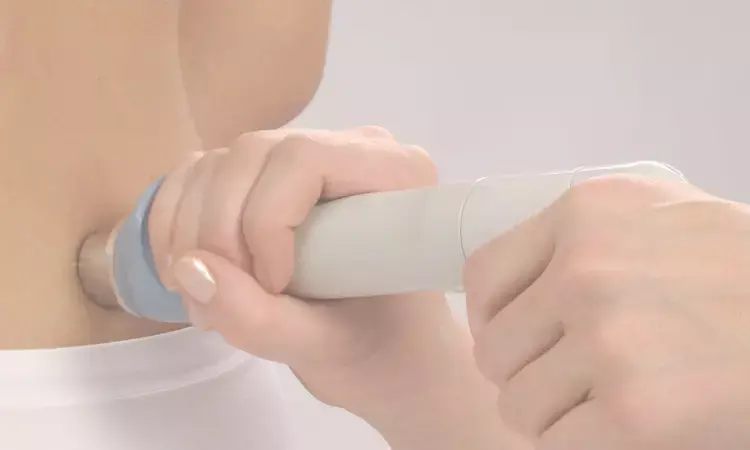- Home
- Medical news & Guidelines
- Anesthesiology
- Cardiology and CTVS
- Critical Care
- Dentistry
- Dermatology
- Diabetes and Endocrinology
- ENT
- Gastroenterology
- Medicine
- Nephrology
- Neurology
- Obstretics-Gynaecology
- Oncology
- Ophthalmology
- Orthopaedics
- Pediatrics-Neonatology
- Psychiatry
- Pulmonology
- Radiology
- Surgery
- Urology
- Laboratory Medicine
- Diet
- Nursing
- Paramedical
- Physiotherapy
- Health news
- Fact Check
- Bone Health Fact Check
- Brain Health Fact Check
- Cancer Related Fact Check
- Child Care Fact Check
- Dental and oral health fact check
- Diabetes and metabolic health fact check
- Diet and Nutrition Fact Check
- Eye and ENT Care Fact Check
- Fitness fact check
- Gut health fact check
- Heart health fact check
- Kidney health fact check
- Medical education fact check
- Men's health fact check
- Respiratory fact check
- Skin and hair care fact check
- Vaccine and Immunization fact check
- Women's health fact check
- AYUSH
- State News
- Andaman and Nicobar Islands
- Andhra Pradesh
- Arunachal Pradesh
- Assam
- Bihar
- Chandigarh
- Chattisgarh
- Dadra and Nagar Haveli
- Daman and Diu
- Delhi
- Goa
- Gujarat
- Haryana
- Himachal Pradesh
- Jammu & Kashmir
- Jharkhand
- Karnataka
- Kerala
- Ladakh
- Lakshadweep
- Madhya Pradesh
- Maharashtra
- Manipur
- Meghalaya
- Mizoram
- Nagaland
- Odisha
- Puducherry
- Punjab
- Rajasthan
- Sikkim
- Tamil Nadu
- Telangana
- Tripura
- Uttar Pradesh
- Uttrakhand
- West Bengal
- Medical Education
- Industry
Low-force extracorporeal shock wave aids early recovery in penile rehabilitation of erectile dysfunction: Study

Korea: A new study published in the Journal of Clinical Medicine suggests that low-force extracorporeal shock wave treatment (LI-ESWT) showed a measurably huge impact on early recuperation in penile restoration of erectile dysfunction (ED) following radical prostatectomy (RP).
Erectile brokenness is a notable confusion of radical prostatectomy. Oral 5-phosphodiesterase inhibitors are presently the most broadly involved penile recovery treatment for ED following RP, yet they are less viable than for those with general ED. LI-ESWT, causing a natural change that prompts neovascularization, has as of late been utilized as a treatment for ED. Hence, Beom Yong Rho and the group led an efficient survey and meta-examination to explore the effectiveness of LI-ESWT in ED following RP.
Embase, PubMed, and the Cochrane Library were looked up until December 2021. The endpoint was the adjustment of IIEF scores after LI-ESWT. Five papers (460 patients) were remembered for the last examination.
The key findings of this study were as follows:
1. In IIEF scores performed 3-4 months after LI-ESWT, the gathering getting LI-ESWT showed measurably altogether improved results than the control.
2. Notwithstanding, there was a sum of two investigations that deliberate the outcomes following 9 a year.
3. There was no measurable contrast between the two gatherings.
In conclusion, In this meta-examination, LI-ESWT showed a measurably huge impact on early recuperation in the penile recovery of ED following RP or extremist cystoprostatectomy. In any case, there was no massive contrast in the long haul follow-up results, and the information was as yet lacking. Subsequently, the researchers propose that LI-ESWT could be a possibility for early ED recuperation after RP.
In any case, the degree of proof was low. Thus, cautious translation of the outcomes is required, and extra all-around planned huge scope RCT studies are required.
Reference:
Rho, B. Y., Kim, S. H., Ryu, J.-K., Kang, D. H., Kim, J. W., & Chung, D. Y. (2022). Efficacy of Low-Intensity Extracorporeal Shock Wave Treatment in Erectile Dysfunction Following Radical Prostatectomy: A Systematic Review and Meta-Analysis. In Journal of Clinical Medicine (Vol. 11, Issue 10, p. 2775). MDPI AG. https://doi.org/10.3390/jcm11102775
Neuroscience Masters graduate
Jacinthlyn Sylvia, a Neuroscience Master's graduate from Chennai has worked extensively in deciphering the neurobiology of cognition and motor control in aging. She also has spread-out exposure to Neurosurgery from her Bachelor’s. She is currently involved in active Neuro-Oncology research. She is an upcoming neuroscientist with a fiery passion for writing. Her news cover at Medical Dialogues feature recent discoveries and updates from the healthcare and biomedical research fields. She can be reached at editorial@medicaldialogues.in
Dr Kamal Kant Kohli-MBBS, DTCD- a chest specialist with more than 30 years of practice and a flair for writing clinical articles, Dr Kamal Kant Kohli joined Medical Dialogues as a Chief Editor of Medical News. Besides writing articles, as an editor, he proofreads and verifies all the medical content published on Medical Dialogues including those coming from journals, studies,medical conferences,guidelines etc. Email: drkohli@medicaldialogues.in. Contact no. 011-43720751


